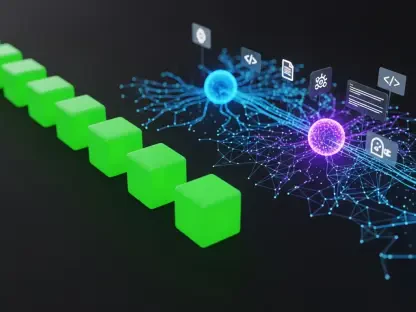Imagine a coding world where intricate programming problems dissolve effortlessly, allowing developers to focus on more strategic tasks. This dream is rapidly becoming reality, with Alibaba’s unveiling of its state-of-the-art open-source AI model, Qwen3-Coder. As the tech behemoth strives to push the frontiers of AI-driven development, this cutting-edge innovation hints at a transformative shift within the realm of software programming.
Shaping the Landscape of AI in Coding
Alibaba’s Qwen3-Coder represents a milestone in artificial intelligence, setting new benchmarks with its outstanding capabilities in handling complex coding tasks. This model’s groundbreaking features, such as its massive parameter architecture and token capacity, suggest a future where AI’s role in coding is not just supplementary but essential. With such advanced technology, one must wonder: How will AI redefine the software development industry landscape and address existing challenges?
Addressing Real-World Development Challenges
Innovative AI solutions like Qwen3-Coder emerge amid increasing demands for productivity and efficiency in software development. As the complexity of coding tasks grows, developers and organizations worldwide turn to advanced AI tools to keep pace. The global trend leans toward automation and optimization, making tools like Qwen3-Coder invaluable. Moreover, as Chinese tech companies aim to challenge Western dominance, the competitive dynamics in the software industry are becoming more intense than ever.
Technical Prowess of Qwen3-Coder
Behind Qwen3-Coder’s groundbreaking impact lies an impressive architectural design: the Qwen3-Coder-480B-A35B-Instruct model. This impressive technology boasts a 480-billion-parameter Mixture-of-Experts design, combined with 35 billion active parameters. Such sophistication allows for handling massive context within its 256,000 to 1,000,000 token window, setting it apart from competitors like Anthropic’s Claude Sonnet 4. By harnessing these dynamic capabilities, Qwen3-Coder not only meets but exceeds expectations in coding performance.
Insights from Experts in the Field
Many industry specialists herald Alibaba’s advancements with Qwen3-Coder as a bold step forward for AI in tech. Lian Jye Su, an Omdia analyst, points to the model’s versatility and performance as game-changers. Abhishek Sengupta highlights China’s significant strides in AI and technology, while Charlie Dai from Forrester applauds agentic features that empower autonomous coding. Early adopters of Qwen3-Coder have already shared positive experiences, noting that the tool seamlessly integrates into development workflows, enhancing productivity and creativity.
Advancing Software Development with Qwen3-Coder
For enterprises eager to harness Qwen3-Coder’s capabilities, the opportunities are immense. Automating coding tasks and utilizing agentic coding strategies are more than feasible—they are becoming essential for maintaining a competitive edge. Nevertheless, integrating such advanced tools requires caution, particularly concerning data security and intellectual property. Enterprises must craft thoughtful strategies to navigate these challenges. Successfully leveraging Qwen3-Coder could yield profound benefits in both innovation and efficiency in coding operations.
Embracing Change and Looking Ahead
As Qwen3-Coder continues to garner attention and adoption, the implications for software development are profound. Looking ahead, developers and enterprises must remain agile, embracing AI advancements to sustain growth. As Alibaba’s innovation demonstrates, AI is poised to become not merely a tool in the coder’s arsenal but a pivotal force driving the industry’s entire evolution. AI’s role is no longer a question of if but how transformative it will become, shaping the future of software development for years to come.









